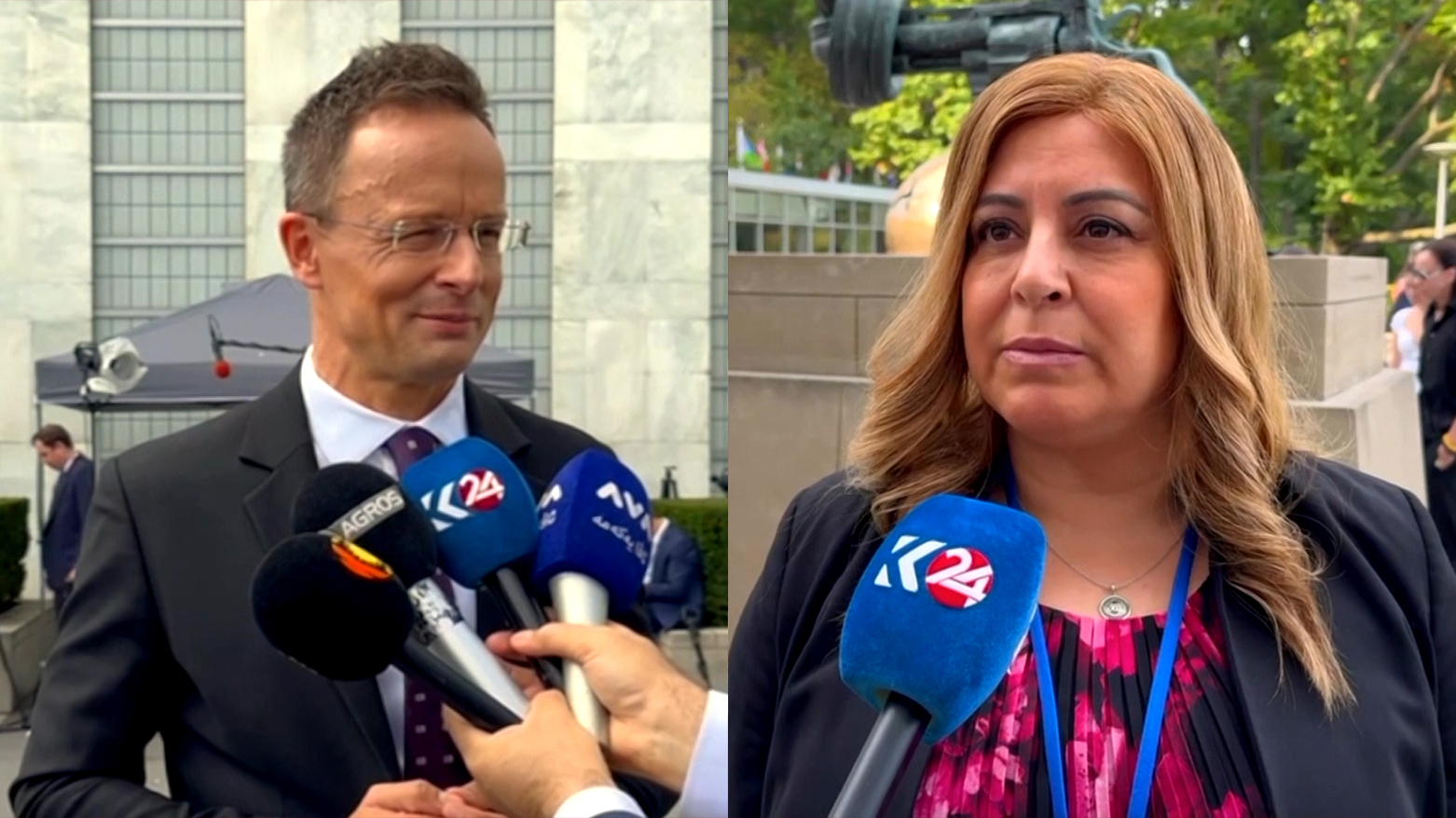Kurdistan24 Exclusive: KRG’s Treefa Aziz and Hungary’s Foreign Minister Voice Kurdish Concerns at UN
KRG Rep. Treefa Aziz, at UNGA, stressed resolving oil export disputes with Baghdad to ensure regular salary payments. Hungary's FM affirmed anti-ISIS support and openness to visiting Kurdistan.

Erbil (Kurdistan24) – In a series of exclusive high-level interviews conducted by Rahim Rashidi, head of Kurdistan24’s Washington bureau and widely known as Mr. Kurd, Kurdish and international officials underscored the pressing challenges facing the Kurdistan Region, the war against ISIS, and the urgent need for financial stability during the 80th session of the United Nations General Assembly in New York.
Treefa Aziz, the Kurdistan Regional Government’s (KRG) representative to the UN General Assembly as part of Iraq’s delegation, highlighted the importance of Kurdish participation in global diplomacy. “It is an honor for us to be here and represent the Kurdistan Regional Government as part of the Iraqi delegation to the UN General Assembly high-level meetings,” she said, noting that many world leaders and foreign governments were in attendance. She emphasized that the KRG was holding serious discussions about the Middle East while also meeting foreign diplomats to strengthen ties with the United States, European countries, and other regions.
Aziz made clear that one of the most urgent matters for Erbil was the resumption of oil exports, stalled since 2023. “We are looking forward to a resolution for the oil exports to resume from the Kurdistan Region. That will ensure that the budget, allocations, and salaries of our civil servants will also be sent on a regular basis,” she stressed, adding that the KRG’s international supporters were aligned with the resolution of these long-standing disputes between Erbil and Baghdad.
Her remarks followed Kurdistan24’s exclusive reporting that on September 23, Norwegian oil and gas operator DNO ASA welcomed the breakthrough agreement between the KRG, the Iraqi federal government, and international oil companies to resume crude oil exports through the Iraq-Türkiye Pipeline (ITP). The deal is expected to restore an initial 230,000 barrels per day via Ceyhan, ending a multi-billion-dollar stalemate that had paralyzed the sector for more than two years.
Hungary’s Foreign Minister of Foreign Affairs and Trade, Péter Szijjártó, also spoke with Kurdistan24, reaffirming his government’s commitment to fighting global terrorism. “Hungary has been an active participant in the anti-terror fight. You can count on us when it comes to fighting against terrorist organizations because we know that terrorist organizations make your life struggling and suffering. Everybody has the right to have a safe life without the threat of terror,” he said.
When asked if he planned to visit Kurdistan, Szijjártó replied that it would depend on an invitation, but he expressed warm memories of his previous visit. “If I get the invitation, I’ll be there again. I was there once, I really enjoyed it, and we really enjoy the very pragmatic cooperation we do have,” he remarked.
The momentum behind the oil export deal has been reinforced by recent developments in Erbil and Baghdad. On September 24, the KRG Council of Ministers, chaired by Prime Minister Masrour Barzani, discussed the finalized agreement, emphasizing that the Kurdistan Region had completed all necessary preparations. Under the arrangement, all oil produced in the Kurdistan Region—except for domestic consumption—will be handed over to Iraq’s State Organization for Marketing of Oil (SOMO), ensuring a unified marketing system.
The KRG Council underlined that the implementation of the tripartite deal is central to ensuring stability in salary disbursements. It welcomed Baghdad’s approval of the agreement and its decision to release July salaries, while August and subsequent months are also expected to follow. The Council stressed that “the government reaffirms its commitment to fulfilling obligations and providing salaries and entitlements to the people of the Kurdistan Region.”
This development builds on the September 17 meeting of the KRG Council of Ministers, during which Cabinet Secretary Amanj Raheem presented a report outlining the joint proposal with Baghdad. That agreement, endorsed by the Iraqi Council of Ministers, confirmed the handover of oil to SOMO while obligating the federal Ministry of Finance to release delayed July and August salaries.
The alignment between Kurdish representatives and international partners at the UN General Assembly reflects both the diplomatic importance of Kurdish engagement and the urgency of financial stability for the region.